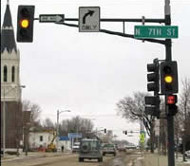3/1/2018
Illinois Appellate Court Again Sides With Short Yellow TimesSecond highest court in Illinois gives Chicago a pass for using 2.9 second yellows at red light camera intersections.

Short yellow times are just fine, the Illinois Appellate Court declared in a ruling last month. A three-judge panel rescued Chicago's red light camera program from the prospect of paying $7.7 million in refunds to the 77,000 motorists who were ticketed at intersections where the yellow light was shorter than the federally mandated three-second minimum.
In 2014, a number of administrative law judges began throwing out red light camera tickets after it was shown that individuals were being ticketed for entering the intersection after the light had been yellow for 2.9 seconds. Turning the light red an extra tenth of a second early created 77,000 tickets. Subsequent investigation revealed that the signal controller allowed the yellow time, set at 3.0 seconds by Chicago, to fluctuate from 2.89 seconds to 3.12 seconds, as confirmed by the device's manufacturer.
"Essentially, plaintiffs argue that the city's yellow light signals do not conform to MUTCD [Manual on Uniform Traffic Control Devices] standards because given normal fluctuations in power line frequencies, the actual minimum duration could be as short as 2.89 seconds," Judge Sheldon A. Harris wrote for the appellate court. "However, as noted in the Peek Traffic/Signal Group letter, the actual duration could also be from 3.0 to 3.12 seconds which would be in compliance with the MUTCD minimum recommendations."
In 2015, the appellate court threw out direct video evidence that showed, on many occasions, the yellow lasted just 2.9 seconds. So in the new ruling, the judges ruled it was "mere speculation" to claim that the yellow timing ever fell below 3.0 seconds.
Chicago's own inspector general looked into the controversy and identified documents that proved the city had ordered Xerox to issue tickets when the light lasted for 2.9 seconds -- something that even Redflex Traffic Systems, the Australian vendor caught in a corruption scandal, refused to do when it was in charge of the cameras (view report). Mayor Rahm Emanuel (D) briefly considered offering refunds for the shortened signal timing, but he later decided not to do so.
The three-judge appellate panel also provided cover to Chicago for entering the deal with Redflex Traffic Systems of Australia to issue red light camera tickets as civil violations in 2003, before the General Assembly legalized such arrangements.
A copy of the ruling is available in an 80k PDF file at the source link below.


